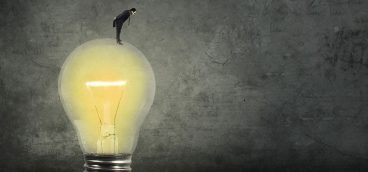3 Not-So-Simple Questions

Pittsburgh Quarterly invited the heads of the region’s top independent schools to address three important questions, in 200 words or less for each.
How are the political tensions of our country being reflected in your school community and how are you addressing these issues?
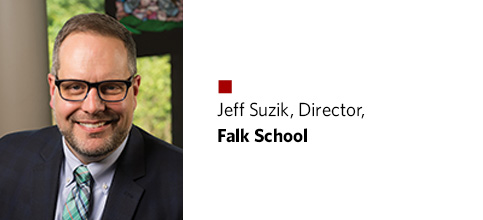
Jeff Suzik, Director, Falk School One of the most regrettable outcomes of our increasingly polarized political culture has been the growing lack of respect for beliefs and perspectives different from our own. We’ve all noted, I’m sure, how vitriolic the discourse about what the “other side” thinks, does, or believes has become in our own lives as adults, so it probably should come as no surprise that this has made its way into schools and the lives of our kids, too. We’ve certainly seen an uptick this year in students being, well, not so kind to one another, often in regards to their differing perspectives on how the world works—politically and otherwise. As a school that has long encouraged open, discursive inquiry—between students and their teachers and between students and students—we’ve worked hard to make sure that there’s space and time for these most difficult conversations to happen. And when there hasn’t been time or space allocated for such conversation to happen, we create them. This has led us, in fact, to build a programmatic schedule for next year that will better accommodate more formal and informal opportunities for our students to discuss and debate issues of the day.
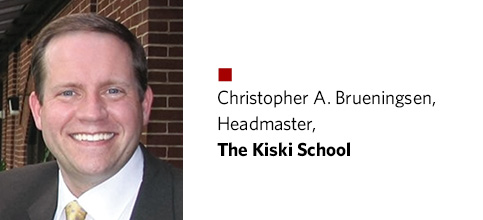
Christopher A. Brueningsen, Headmaster, The Kiski School With political divisions at an all-time high, teachers and school leaders are worried that our students will learn unwholesome habits from watching the behavior of politicians who favor personal attacks over meaningful debates on policy. As a result, many teachers have become hesitant to discuss politics in their classrooms. In this intensely polarized landscape, it’s challenging to distill the discourse to relevant issues. But that’s the reason it’s more important than ever for us to supply our students with the tools they need to engage in discussions as we help them process what they’re seeing and hearing. Teachers can lead discussions about political policies. But if we stop there, we’re doing our students a disservice. We need to talk to our kids about the conduct they’re witnessing—lying, cheating, bullying— that if repeated in a school setting would get them suspended, maybe expelled. We can appeal to their sense of equity and justice: if it’s not okay for you to behave this way, why should it be acceptable for a politician to do it? It’s a chance to talk about the ultimate power and responsibility we have as citizens when we cast our vote. These learning opportunities can only happen if we’re willing to engage in open conversations in our classrooms.
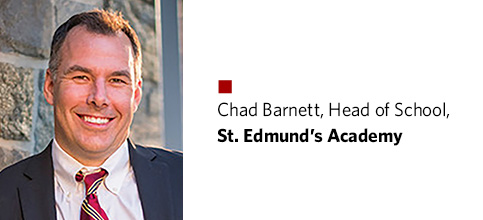
Chad Barnett, Head of School, St. Edmund’s Academy During the height of political tension in 2016, children witnessed an erosion of respect and decency. With their lens of perception shaped by our school’s core values, students at St. Edmund’s Academy felt unsettled by crass behavior presented as political discourse. One child notably asked, “Can we elect people who violate so many of our core values that we probably wouldn’t allow them to attend our school?” Regardless of political affiliation, all of us at St. Edmund’s Academy felt the responsibility to protect and reinforce our commitment to character. At our school this means filling our students’ hearts and minds with examples of our core values in action. The longstanding tradition of public commendations at our weekly interfaith chapel service celebrates the timeless values that shape our students’ moral compass. One by one students stand as their names are called for exhibiting our core values. By naming the child, describing the specific action, and connecting it to a core value, we reinforce our conviction that honesty, respect, responsibility, and service lead to public recognition. More importantly, they contribute to a deeper feeling of self-worth and purpose that begins within every child.
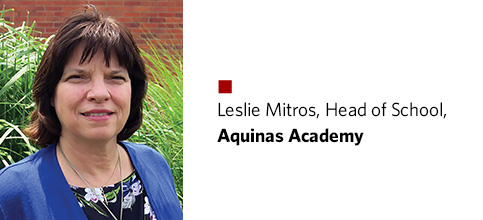
Leslie Mitros, Head of School, Aquinas Academy At Aquinas Academy, the political tensions of our country are reflected in the school community only in as much as they shine the light on issues regarding justice and the dignity of the human person. Our students develop an understanding of truth and goodness through the lens of faith and reason. Students learn that one can indeed evaluate right and wrong objectively; there is a moral order that is known through human reason and divine revelation. Therefore, the tension is not necessarily political or bipartisan but, in many cases, is created by the moral relativism that permeates our culture. There are diverse political opinions at our school that are examined in the light of truth. Within the classroom setting and at age-appropriate levels, the students discuss and consider many of the issues that are or have become political—right to life, gender identity and the definition of marriage, just economic systems, and just war. These are not political tensions but rather the complex social and moral issues of our time. Within the school setting we seek to develop students’ understanding of these issues and to cultivate compassion for all. Charity is our guiding principle.
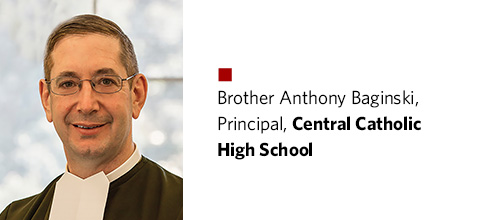
Brother Anthony Baginski, Principal, Central Catholic High School At Central Catholic High School’s Spring scholars’ forum, a senior presented his thesis: “Using a Chomsky-Herman Lens to Understand Fear in the Media.” His premise was that with so many sources for news, items that evoke a strong emotional response get noticed and reposted, and politics has become a battle of emotions more than ideas. Central Catholic brings together students from almost every school district in the greater Pittsburgh area and reflects the demographic and socio-economic status of the region, as well as the diversity of opinions and viewpoints. Much of the political tension in our country is due to the demonization of a person or class to evoke that emotional response as much if not more so than the ideas that are held. At Central Catholic, the person whose ideas you may not agree with is your classmate, teammate, and sometimes your best friend. We actively work to promote and sustain a culture of understanding and respect while promoting critical thinking and discourse. In our most recent election cycle, students analyzed and debated topics and meaning using historical, ethical, and literary frameworks. Formal classroom dialogue combines with informal discussion in the dining hall and helps students understand divergent perspectives.
There is a sense that there is an erosion of longstanding values/ virtues in our culture (i.e. humility, honesty, selflessness, kindness, respect, etc.). What is your school doing to preserve these among students?

Gary J. Niels, Head of School, Winchester Thurston School Our credo, “Think also of the comfort and rights of others,” is a touchstone for all at WT. Our school community is kind. Yet we cannot ignore how the larger culture affects the moral and ethical development of our students. A few years ago, when I raised a dialogue about moral life in our school, I was met with a chorus of concern among faculty about the impact today’s social climate has on our young people. In response, we have recommitted ourselves to ensure we have a school community based on choosing right over wrong, on not just being good, but doing good. A “Think also” committee guides us as we weave our principles into our culture, practicing norms that demonstrate intellectual courage, integrity, empathy, respect, and humility in large and small ways: friendly greetings, handshakes, and eye contact; caring for our spaces; taking an interest in others—employing good manners because it is kind to do so. Many families choose WT in part because we live the “Think also” credo. I’m heartened by this, and by the commitment our school has made to promote the countercultural work of morality, kindness, and ethics.

Macon Finley, Head, The Ellis School At Ellis, one of our fiercely held core values is to shape students who make a difference in the world. Ellis girls develop into young women of great kindness who care deeply about others, who are honest and respectful, who can work fluidly and collaboratively with diverse groups, who understand complex challenges in the local community and in the larger world, who are committed to being responsible and proactive global citizens and leaders. We start this work in the very early grades, with service learning experiences at every grade level that connect classroom learning with community engagement throughout Pittsburgh. Character education is deeply embedded throughout the Lower School curriculum. Girls learn how concepts such as honesty and integrity influence social studies, environmental justice, language arts, and sciences. Service learning becomes even richer in the Middle and Upper School, and continues to be integrated with classroom learning so girls develop a rich understanding of complex problems. Middle School girls combine current events, history, environmental science and business as they participate in the Ellis Earthkeeping Experience, helping students recognize their potential to better care for the environment through a personal commitment. The grade 8 capstone project challenges students to reflect on global issues through an intensive, in-depth project on a developing country. Upper School students plan and lead an annual Culture Jam through which they connect students from more than a dozen local high schools as they engage in deeply reflective workshops and discussions that build cultural competency and foster inclusivity.

Justin Zimmerman, Headmaster, The Linsly School Since 1814, The Linsly School has always emphasized character development, and we continue to focus on the “traditional” values that have always mattered. As members of our school community, it is the expectation that all Linsly students value and strive to demonstrate the character traits as outlined and defined below:
Integrity: Honesty; trustworthiness; personal reliability. Respect: Personal honor; empathy; kindness to others. Responsibility; Dependability; values-driven. Perseverance: Relentless in the face of challenge; willingness to grow from failures. Courage: Grit; confident in one’s abilities. Citizenship: Qualities expected as a responsible member of a community.
We discuss these character traits in all-school meetings and remind students of these traits on a daily basis in the classroom and in co-curricular programs. In addition, students are evaluated and given feedback at the end of each academic grading period. Students who live up to these values are awarded special distinction and placed on the Headmaster’s Performance List, which is indicated on their report card. At The Linsly School, we believe it is our obligation to emphasize and develop these longstanding values/virtues in students. As a result, we will continue to emphasize the values that have helped generations of alumni to become successful.
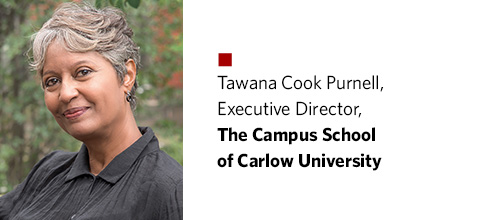
Tawana Cook Purnell, Executive Director, The Campus School of Carlow University School leaders often say we are charged with preparing students for the future. Research-exhausted pedagogical trends are considered as we engage in conversations about both teaching and learning. In this, the “Information Age,” so much of what students now have immediate access to seemed to constitute a significant portion of “curriculum” a few decades ago. Simply speaking, students memorized information, applied it to similar situations, and eventually analyzed it before creating something new, thus successfully cycling through a credible taxonomy of “thinking skills.” However, as the educational conversation turned to “21st century skills,” independent schools’ strategic plans and missions were intentional in regarding new skills—collaboration, creativity, critical thinking, information literacy, leadership, and global awareness—as being as significant as their core academic curriculum if education is truly preparing students for the future. Schools are using technology to enhance options for learning opportunities. Bricks and mortar schoolhouses – desks in rows or circular tables and the Harkness method, or teacher in front – have come under question as hybrid models flourish. And we are adapting… And yet, somewhere along the line between centuries, intellectually stimulated students in good independent schools have been taught necessary lessons about altruism and responsibility to the greater good. They want to “make the world a better place.” Students know, they understand, they apply, they synthesize. More importantly, however, they must learn what is important. They must learn how to engage with each other and their world respectfully. They must learn the importance of following as well as leading. By making the tenets of character education— kindness, reliability, tenacity, respect —front and center of everyday life in a school community, that school assures its commitment to true societal sustainability. Without such a curriculum, both explicit and implicit, education becomes a hollow exercise.
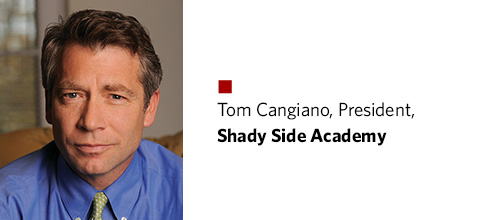
Tom Cangiano, President, Shady Side Academy I don’t agree that there’s been a general erosion of longstanding values/virtues. I believe there actually have been some significant gains in terms of the general acceptance of people from diverse backgrounds and different life situations, something that is very much a part of the younger generation’s worldview. Schools have probably seen an uptick in the incidence of academic dishonesty, but I think this is partly the result of the increased college admissions pressures that this generation of students is facing. Shady Side’s guiding principles—honesty, kindness, respect, responsibility and safety—are something that we constantly invoke in our work with students. This has helped us to maintain the kind of learning community that is most beneficial to students’ personal growth and intellectual development. Our guiding principles are our North Star, and they have always guided us through normal and not-so-normal times.
With the increasing presence of online education—apparent in online only schools or so-called hybrid online/bricks and mortar schools—do you believe this trend will continue? And what is your school doing to evolve and adapt to this changing landscape?
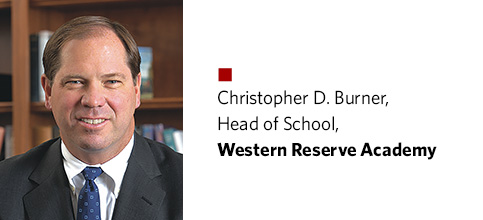
Christopher D. Burner, Head of School, Western Reserve Academy Christopher D. Burner, Head of School, Western Reserve Academy Technology is a hugely valuable tool for teaching, but the value of in-person experiences between students and teachers will endure, no matter how sophisticated technology becomes or how many online opportunities exist. The best schools will find a way to use technology to encourage collaboration between students and faculty, as in our Center for Technology, Innovation & Creativity. Here, teachers from every domain invite students to problem solve and move ideas from the concept stage through creation. For example, students in one of our English classes were tasked with developing 3-D personal narratives using wood blocks, a very different experience than just putting pen to paper. I believe people will see the most value in educational settings that offer a progressive brick and mortar environment including the latest technology tools, but rooted in everyday personal interactions.

Katherine M. Titus, Head of School, Mercersburg Academy At Mercersburg, we consider it a true privilege to serve our students and families as a residential community, where learning is continuous and not limited to the confines of the academic day. There is no substitute for face-toface interaction and conversation between peers and supportive community members. Some of the most important and fulfilling moments in a young person’s experience at Mercersburg can happen over a meal in the dining hall, in the dormitory, on trips with athletic teams or community groups, in a studio or performance hall, or simply through the development of friendships nurtured by our shared experiences as a community. There is a place for online learning to support the growth of individual interests but not to replace the personal connections which allow for deep and lasting learning to take root. As a boarding school, we believe that the best environment for learning is one where personal growth is as valuable as academic growth. We remain committed to growing interdependent, lifelong learners who are prepared to lead our world into a future that is uncertain.
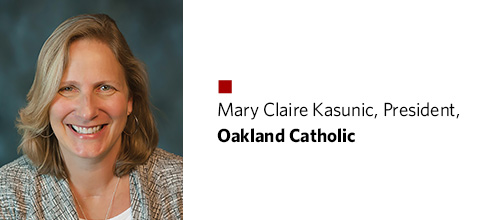
Mary Claire Kasunic, President, Oakland Catholic Technology has boosted our capacity to access knowledge, to connect with the broader world, and to learn in different ways. All that is good news for students and teachers committed to lifelong learning. At Oakland Catholic High School, we embrace the positive elements of technology with a 1:1 laptop program, shared educational platforms, and flipped classrooms. Courses in Java, bioinformatics, engineering, and A.P. Computer Science, along with collaborations with Carnegie Mellon University and the University of Pittsburgh underscore the tremendous advantages that technological skills afford students. Online platforms and courses have the ability to extend learning opportunities and expand the walls of a school, but as an educator, I strongly believe that online courses should work in tandem with a personalized educational experience, and not just serve as a substitute for an on-site class. Online learning (and teaching) demands different strategies in order to maintain a school’s educational philosophy and mission. The process of researching and gradually integrating specific online learning opportunities and courses into our curriculum is an ongoing endeavor at Oakland Catholic High School. The same critical thinking skills demanded of our students are employed by our educators with regard to how to optimize the learning environment.
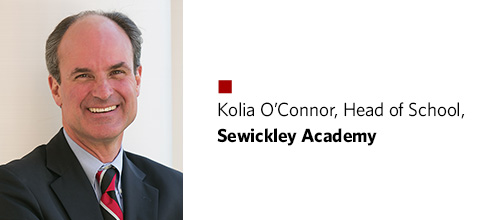
Kolia O’Connor, Head of School, Sewickley Academy It’s difficult to predict future trends in education, especially since classrooms haven’t changed that much over the last century. While we have embraced the use of technology in our classrooms, adopting a one-toone framework, where students in our Middle and Senior Schools bring their own digital devices to school, the core of our education is based on relationships, between students and their teachers and among students themselves. Thanks to advances in technology, our students have had some really extraordinary experiences. For instance, students were able to speak to alumnus Lt. Col. Michael Fincke ‘85 while he was aboard the International Space Station. Senior School students participated in Conflict Kitchen’s Foreigner Project, an interactive art installation where our students had the opportunity to speak to a foreigner in Palestine and/or Iran via other Sewickley Academy students acting as avatars. In this experience, students spoke to the foreigner via a microphone and the foreigner responded through an avatar, who interpreted the responses live. Through the Pittsburgh Arts & Lectures authors in schools series, the Academy was able to host an author live and students from around the Pittsburgh area were able to participate through video conferencing. I don’t see online education as a competition. In fact, we want to harness technology to allow us to provide an educational experience that students wouldn’t have without it. We subscribe to a blended learning framework where the best of online education complements the best of on-ground education. Most families that enroll their children at SA are looking for human relationships which are so essential to a quality Pre-Kindergarten through Grade 12 education. They also want to know that their children will be prepared to navigate an increasingly technology- dependent world with sophistication and ease. Through our commitment to blended learning, parents have the best of both worlds.



